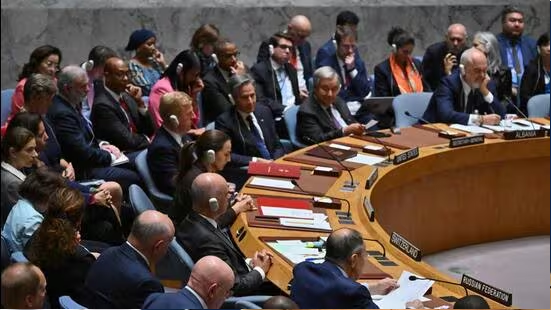INDIA’S PUSH FOR UNSC REFORM AND AFRICAN REPRESENTATION
Why in the News?
India’s recent appeal for reform in the United Nations Security Council (UNSC), with a particular focus on including African nations in its permanent membership, has brought renewed attention to the ongoing debate surrounding the structure and efficacy of the UNSC. R. Ravindra, India’s charge d’affaires at the UN, highlighted these concerns during the High-Level Open Debate on Peace building and Sustaining Peace, underlining critical issues that impact global governance and international relations.
Resource : The Hindu
| The Imperative for UNSC Reform:
The UNSC, formed in the aftermath of World War II, currently consists of five permanent members (P5) with veto power: the United States, the United Kingdom, France, Russia, and China. This configuration mirrors the power dynamics of the mid-20th century rather than today’s global realities. Over the decades, calls for reform have grown louder, driven by the need to make the UNSC more representative and credible in the eyes of the international community. India, along with other nations like Japan, Germany, and Brazil (collectively known as the G4), has been at the forefront of advocating for an expansion of permanent membership to include countries from underrepresented regions, especially Africa. The Absence of African Representation: The exclusion of African countries from the UNSC’s permanent membership is a glaring oversight, especially considering Africa’s significant geopolitical role and the fact that a large portion of the Council’s peacekeeping efforts are concentrated on the continent. India has pointed out, through Ravindra’s statements, that this lack of representation undermines the UNSC’s legitimacy and hinders its ability to effectively address issues affecting the Global South. The African Union has long demanded at least two permanent seats for African nations, a position India strongly supports as part of its broader push for comprehensive UNSC reform. India and the Global South: India’s emphasis on terrorism as a global menace and its call for a comprehensive international anti-terrorism convention further underline its role as a pivotal player in the Global South. India’s extensive development partnerships, amounting to over $40 billion, demonstrate its commitment to promoting peace through development. Prime Minister Narendra Modi’s proposal for a comprehensive global development compact at the third Voice of the Global South virtual Summit underscores India’s vision for a more just and equitable international order. Geopolitical Challenges: The remarks by Sierra Leone’s Foreign Minister, Alhaji Musa Timothy Kabba, about the world being “on fire” due to various conflicts, highlight the complex interplay of geopolitical tensions, economic inequalities, climate change, and the spread of weapons. These challenges underscore the pressing need for a more effective and representative UNSC that can address these issues in a holistic and timely manner. Strategic Implications for India: India’s advocacy for UNSC reform and the inclusion of Africa reflects its rising influence and ambitions on the global stage. As a prominent voice for the Global South, India’s push for reform is not only a call for a fairer international order but also a strategic move to strengthen its own bid for permanent membership. By aligning with African nations and championing causes pertinent to the Global South, India bolsters its position as a responsible global leader committed to democratizing international institutions. |
Conclusion:
India’s strong stance against those opposing UNSC reform and its unwavering support for African representation highlight the urgent need to restructure global governance frameworks to better reflect the realities of the 21st century. As global challenges and geopolitical tensions continue to escalate, the demand for a more inclusive and effective UNSC will become increasingly critical.




